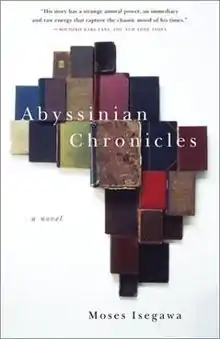Abyssinian Chronicles
Abyssinian Chronicles is a 1998 novel by Ugandan author Moses Isegawa.[1]
 | |
| Author | Moses Isegawa |
|---|---|
| Country | Uganda |
| Language | English |
| Publisher | Alfred A. Knopf |
Publication date | 1998 |
| Media type | Print (hardback & paperback) |
| Pages | 512 |
| ISBN | 9780375406133 |
Plot
The book is set in Uganda, in the 1970s and '80s. The book follows the life of narrator Mugezi Muwaabi, as he plots his own independence from his parents and capitalizes on his considerable natural resources of charm and intelligence.[2] A grandfather, a father and his son are the three figures that form a tripod from which the novel is set. Grandpa represents the traditional order, his son Serenity the chaos of transition, and Mugezi the despair of a younger generation over the dead end of transition and its own prospects. Rootless and bitter, Mugezi flees to Europe from Uganda.[3][4] The first part of the book centres on Mugezi, a young man growing up in post-colonial Uganda. Born in 1961, a year before Uganda attained independence, Mugenzi describes a troubled childhood living under the tyranny and strict rules of his parents. The family moves to Kampala, the nation's capital about the time Idi Amin comes to power in 1971. In the second half of the book Mugezi is excited about the country's prospects under Idi Amin, following the ouster of Milton Obote and his corrupt government. Soon, however, Amin's regime descends to the depths of brutality and mismanagement – starting with a botched "Africanization" campaign that leads to the expulsion of thousands of Asian businessmen.[5]
Critical reception
The book received both positive and negative reviews.
Richard Eder of The New York Times said : Abyssinian Chronicles suffers from a disabling split. It is best as a chronicle of Ugandan history and of the struggles of different generations of a family to cope with it. It is weakest as a third world bildungsroman.[3]
Anderson Tepper in a review in Salon noted: "Abyssinian Chronicles doesn’t quite synthesize the jumble. Instead, the reader is left, like Mugezi at the end, alone, a bit wobbly and haunted from such a long journey."[6]
Maya Jaggi in The Guardian wrote: "Abyssinian Chronicles may lack the sedate control of distance, but it has a momentum and energy that derive from the trauma it tells from the inside."[7]
References
- Geoff Wisner. "Abyssinian Chronicles". Archived from the original on 2 April 2015. Retrieved 17 February 2015.
- "Abyssinian Chronicles by Moses Isegawa". The Complete Review. Retrieved 17 February 2015.
- Richard Eder (2 July 2000). "Out of Africa". The New York Times. Retrieved 17 February 2015.
- Magdalena Ball (18 March 2003). "A review of Moses Isegawa's Abyssinian Chronicles". Compulsive Reader. Retrieved 17 February 2015.
- Daniel Musiitwa (5 October 2010). "Abyssinian Chronicles (by Moses Isegawa)". Africa Book Club. Retrieved 17 February 2015.
- Anderson Tepper (28 June 2000). ""Abyssinian Chronicles" by Moses Isegawa". Salon. Retrieved 17 February 2015.
- Maya Jaggi (18 November 2000). "Into the heart of grunge". The Guardian. Retrieved 17 February 2015.
